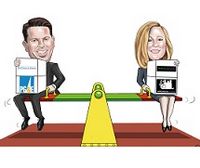Nimble approach pays off
Agility and sharp-eyed analysis of the true state of the market was essential in a year marked by extreme volatility. For this and its creativity in developing innovative structures to assist issuers, Goldman Sachs is IFR’s North America Structured Finance House of the Year.

Goldman Sachs stepped up its game in 2022, deploying creative structures to meet issuer needs in a market that saw many of the traditional methods of structured financing hit walls because of investor fears about rising rates and disruptions caused by geopolitical events like the Russia-Ukraine war.
Tough market conditions caused US securitisation supply (excluding self-funded deals) to drop 37% in the year to US$708.4bn, according to Refinitiv data. That was a stark reversal from a banner year in 2021 when US dollar structured finance issuance set record volumes at historic tight spreads.
”Most of the year was really choppy,” said Steven Moffitt, who runs Goldman’s consumer structured finance business.
What Goldman did, he said, was to look at ways to monetise company assets with new structures “when the regular capital markets are not there”.
Goldman retained its top position in private-label residential mortgage issuance, its runner-up position in commercial real estate, and placed number three overall in Refinitiv’s structured finance league tables. It also gained a top 10 spot in the asset-backed ranking, clocking in at eighth place, behind rivals with much larger balance sheets.
To navigate volatile market conditions, Goldman raised capital for clients through large, broadly syndicated offerings but also via bespoke transactions tailored to a selected group of investors.
For those specialised transactions, it was Moffitt and his group who were tasked with marketing them to wary investors, sometimes transforming the borrower’s corporate finance model.
There was, for example, high-speed fibre-optic provider MetroNet’s inaugural ABS which priced in October. Securing the US$1.22bn offering – called MetroNet Infrastructure Issuer LLC 2022-1 – with its extensive fibre network across five US states helped transform the KKR and Oak Hill Capital-backed company’s capital structure from classic leveraged finance to one based on securitising those assets. In turn, that meant the company could borrow more to finance growth.
“Their leverage gets effectively increased, so it’s a perfect opportunity to maximise capital for a company like this,” said Christina Minnis, Goldman’s co-head of global credit finance.
The MetroNet deal also underscored the emergence of securitisation as a vital funding source for fibre networks, data centres and other telecoms assets.
Goldman was also one of the few banks to navigate a public aviation ABS transaction in 2022, after aircraft bond supply was grounded because of the wide disparity between interest rates and the lease rates on planes. Russia’s confiscation of more than 500 planes owned by overseas lessors also gave serious pause for potential investors.
Despite this inauspicious backdrop, Goldman led a US$522.46m deal in June for The Carlyle Group to finance a portfolio of planes from CK Asset, which was valued at more than US$4bn.
In the esoteric area of music royalty securitisations, Goldman oversaw the US$221.65m investment-grade note for UK music rights management firm Hipgnosis, during challenging market conditions in August. This was Hipgnosis’ first deal ever and was backed by recording and publishing royalties of only five artists – Justin Timberlake, Leonard Cohen, Nile Rodgers, Nelly Furtado and Kenny Chesney.
“We were able to get the deal done over the summer in a relatively tough market,” said Katrina Niehaus, a managing director in Goldman’s structured finance business.
The bank also did not lose sight of ESG issuance, leading Pacific Gas and Electric’s US$983m green bond to fund its wildfire prevention efforts in November. It also structured auto lender First Help Financial’s first social bond, a US$150m deal in October.
In a difficult year for securitisation, Goldman was "nimble and less focused on which world it sits in and whose desk it’s sold off – that’s what distinguishes the franchise", Moffitt said.
To see the digital version of this report, please click here
To purchase printed copies or a PDF of this report, please email leonie.welss@lseg.com

